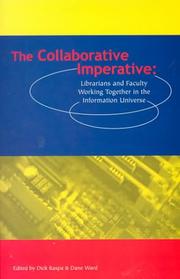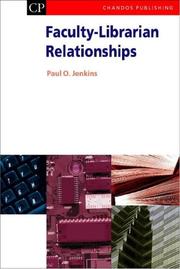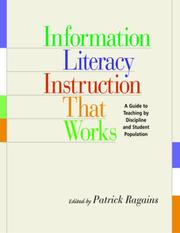| Listing 1 - 10 of 21 | << page >> |
Sort by
|

ISBN: 0838980856 Year: 2000 Publisher: Chicago : Association of College and Research Libraries,
Abstract | Keywords | Export | Availability | Bookmark
 Loading...
Loading...Choose an application
- Reference Manager
- EndNote
- RefWorks (Direct export to RefWorks)

ISBN: 1843341174 9781780630793 1780630794 1843341166 9781843341161 9781843341178 Year: 2005 Volume: *9 Publisher: Oxford Chandos
Abstract | Keywords | Export | Availability | Bookmark
 Loading...
Loading...Choose an application
- Reference Manager
- EndNote
- RefWorks (Direct export to RefWorks)
Faculty-Librarian Relationships illustrates how academic librarians can enjoy a healthy working partnership with the faculty they serve. Though geared towards those new to the profession, the book is aimed at librarians interested in learning more about this often-complex relationship. Helpful strategies are provided for librarians working with faculty in the areas of collection development and information literacy. The book includes a number of interviews conducted with faculty members so librarians have examples of thoughts, concerns and suggestions regarding libraries and librarians.
Documentation and information --- Higher education --- Academic libraries --- Bibliothèques universitaires --- Relations with faculty and curriculum. --- Relations avec le corps enseignant et le programme d'études --- Library science. --- Academic librarians --- Faculty status. --- 027.71 --- 027.71 Universiteitsbibliotheken --- Universiteitsbibliotheken --- Academic libraries - Relations with faculty and curriculum. --- Academic librarians - Faculty status. --- Library-faculty communication --- Universities and colleges --- Curricula --- Faculty --- Faculty status
Book
ISBN: 0081006098 0081005989 9780081006092 9780081005989 Year: 2017 Publisher: Amsterdam, [Netherlands] : Chandos Publishing,
Abstract | Keywords | Export | Availability | Bookmark
 Loading...
Loading...Choose an application
- Reference Manager
- EndNote
- RefWorks (Direct export to RefWorks)
The field of distributed learning is constantly evolving. Online technology provides instructors with the flexibility to offer meaningful instruction to students who are at a distance or in some cases right on campus, but still unable to be physically present in the classroom. This dynamic environment challenges librarians to monitor, learn, adapt, collaborate, and use new technological advances in order to make the best use of techniques to engage students and improve learning outcomes and success rates. Distributed Learning provides evidence based information on a variety of issues, surrounding online teaching and learning from the perspective of librarians. Includes extensive literature search on distributed learning Provides pedagogy, developing content, and technology by librarians Shows the importance of collaboration and buy-in from all parties involved
Information literacy --- Information retrieval --- Study and teaching. --- Academic libraries --- Bibliothèques universitaires --- Culture de l'information --- Relations with faculty and curriculum --- Study and teaching (Higher) --- Computer-assisted instruction --- Relations avec le corps enseignant et le programme d'études --- Etude et enseignement (Supérieur) --- Enseignement assité par ordinateur
Book
ISBN: 9780081007754 0081007752 0081007787 9780081007785 Year: 2017 Publisher: Amsterdam, [Netherlands] : Chandos Publishing,
Abstract | Keywords | Export | Availability | Bookmark
 Loading...
Loading...Choose an application
- Reference Manager
- EndNote
- RefWorks (Direct export to RefWorks)
The Experiential Library: Transforming Academic and Research Libraries through the Power of Experiential Learning features contributions--in a relatively conversational, practical, and "how-to" format--from various academic libraries across broad educational levels that have implemented experiential learning programs, services, or resources to enhance the learning and development of both students and library employees. As academic libraries and academic librarians are seeking ways to transform themselves and create collaborative synergies within and without their institutions, this timely book suggests exciting ways to integrate experiential learning into the library's offerings. Ranging from integrated service learning and Information Literacy instruction that "takes the class out of the classroom," to unique experiential approaches to programming like Course Exhibits and the Human Library, the book is a one-stop-shop for libraries looking to expand their repertoire. It will also help them create connections between experiential learning and their institutions' missions and contributions to student success, by grounding these programs and services on a sure methodological footing. Librarians and educators wishing to learn more about the connections between experiential learning/experiential education and academic libraries would benefit from the advice from authors in this book. Covers experiential learning for academic and research libraries. Presents diverse aspects of experiential learning in academic libraries across the spectrum of educational levels. Offers a one-stop-shop for librarians keen on bringing experiential learning to their institutions. Adds to current conversations in both LIS and experiential education, enabling further synergies in both disciplines.
Academic libraries --- Research libraries --- Experiential learning. --- Bibliothèques universitaires --- Bibliothèques de recherche --- Apprentissage expérentiel --- Relations with faculty and curriculum --- Relations avec le corps enseignant et le programme d'études --- Academic libraries. --- Information literacy. --- Literacy, Information --- Information science --- College libraries --- Libraries, University and college --- University libraries --- Libraries --- Libraries and colleges --- Public libraries --- Services to colleges and universities

ISBN: 9781555705732 1555705731 Year: 2006 Volume: 3 Publisher: New York : Neal-Schuman Publishers,
Abstract | Keywords | Export | Availability | Bookmark
 Loading...
Loading...Choose an application
- Reference Manager
- EndNote
- RefWorks (Direct export to RefWorks)
Information literacy --- Electronic information resource literacy --- Academic libraries --- Culture de l'information --- Connaissances des sources d'information électroniques --- Bibliothèques universitaires --- Study and teaching (Higher) --- Relations with faculty and curriculum. --- Etude et enseignement (Supérieur) --- Relations avec le corps enseignant et le programme d'études
Book
ISBN: 9781442243583 Year: 2016 Publisher: Lanham : Rowman & Littlefield,
Abstract | Keywords | Export | Availability | Bookmark
 Loading...
Loading...Choose an application
- Reference Manager
- EndNote
- RefWorks (Direct export to RefWorks)
Teaching Google Scholar in your library instructional sessions can increase students? information and digital literacy skills. Students? familiarity with Google Scholar?s interface works to the instructor?s advantage and allows more time to address students? information needs and teach foundational information literacy skills and less time teaching a new database with a less-intuitive database interface. Teaching Google Scholar: A Practical Guide for Librarians will illustrate instructional methods and incorporate step-by-step guides and examples for teaching Google Scholar. It begins with providing you with essential background: What Google Scholar is How to set up Google Scholar using OpenURL How to design Google Scholar instructional sessions How to incorporate active learning activities using Google Scholar After reading it, you will be ready to teach students critical skills including how to: Use specific Google Scholar search operators Incorporate search logic Extract citation data, generate citations, and save citations to Google's My Library and/or a citation management program Use Google Scholar tools- including ?cited by, ? ?alerts, ? ?library links, ? and ?library search? Google Scholar is a powerful research tool and will only become more popular in the coming years. Learning how to properly teach students how to utilize this search engine in their research will greatly benefit them in their college career and help promote life-long learning. Google Scholar instruction is a must in today?s modern information literacy classroom
Research --- Information literacy --- Academic libraries --- Web applications in libraries. --- Library orientation for college students. --- Recherche --- Culture de l'information --- Bibliothèques universitaires --- Applications Web dans les bibliothèques --- Etudiants --- Methodology --- Study and teaching (Higher) --- Relations with faculty and curriculum. --- Méthodologie --- Etude et enseignement (Supérieur) --- Relations avec le corps enseignant et le programme d'études --- Initiation à la bibliothèque --- Google Scholar.
Book
Year: 1998 Volume: 4 Publisher: Bruxelles : CIUF (Conseil Interuniversitaire de la Communauté Française),
Abstract | Keywords | Export | Availability | Bookmark
 Loading...
Loading...Choose an application
- Reference Manager
- EndNote
- RefWorks (Direct export to RefWorks)
Academic libraries --- Library orientation --- Bibliothèques universitaires --- Bibliothèques --- Relations with faculty and curriculum --- Congresses --- Congresses. --- Relations avec le corps enseignant et le programme d'études --- Congrès --- Relations entre le corps enseignant et le programme d'étude --- Formation des usagers
Book
ISBN: 1990040284 Year: 2021 Publisher: Wellington : NZCER Press,
Abstract | Keywords | Export | Availability | Bookmark
 Loading...
Loading...Choose an application
- Reference Manager
- EndNote
- RefWorks (Direct export to RefWorks)
This book examines significant questions related to information literacy learning and student transition to higher education in Aotearoa New Zealand. It provides valuable new information on literacy resources as well as new insights into information literacy learning, the role of libraries and librarians, student transition, and teacher-librarian partnerships.
Information literacy --- Information literacy --- Information literacy --- Academic libraries --- Culture de l'information --- Culture de l'information --- Bibliothèques universitaires --- Study and teaching (Higher) --- Study and teaching (Secondary) --- Relations with faculty and curriculum --- Étude et enseignement (Secondaire) --- Relations avec le corps enseignant et le programme d'études --- New Zealand.
Book
ISBN: 9780838985878 0838985874 Year: 2011 Publisher: Chicago, Ill. Association of College and Research Libraries
Abstract | Keywords | Export | Availability | Bookmark
 Loading...
Loading...Choose an application
- Reference Manager
- EndNote
- RefWorks (Direct export to RefWorks)
Information retrieval --- Science --- Library research --- Academic libraries --- Information literacy --- Research --- Library orientation for college students. --- Bibliothèques universitaires --- Culture de l'information --- Recherche --- Etudiants --- Relations with faculty and curriculum. --- Study and teaching (Higher) --- Methodology --- Relations avec le corps enseignant et le programme d'études --- Etude et enseignement (Supérieur) --- Méthodologie --- Initiation à la bibliothèque --- Bibliothèques universitaires --- Relations avec le corps enseignant et le programme d'études --- Etude et enseignement (Supérieur) --- Méthodologie --- Initiation à la bibliothèque
Book
ISBN: 9781843346746 Year: 2012 Publisher: Oxford : Chandos Publishing,
Abstract | Keywords | Export | Availability | Bookmark
 Loading...
Loading...Choose an application
- Reference Manager
- EndNote
- RefWorks (Direct export to RefWorks)
Information literacy may be defined as the ability to identify a research problem, decide the kinds of information needed to tackle it, find the information efficiently, evaluate the information, and apply it to the problem at hand. Teaching Research Processes suggests a novel way in which information literacy can come within the remit of teaching faculty, supported by librarians, and reconceived as ‘research processes’. The aim is to transform education from what some see as a primarily one-way knowledge communication practice, to an interactive practice involving the core research tasks of subject disciplines.This title is structured into nine chapters, covering: Defining research processes; Research ability inadequacies in higher education; Research processes and faculty understanding; Current initiatives in research processes; The role of disciplinary thinking in research processes; Research processes in the classroom; Tentative case studies in disciplinary research process instruction; Research processes transforming education; and Resourcing the enterprise. The book concludes by encouraging the reader to implement the teaching of research processes.
Effective teaching. --- Information literacy --- Academic libraries --- Education --- College teaching. --- Teacher-student relationships. --- Enseignement efficace --- Culture de l'information --- Bibliothèques universitaires --- Sciences de l'éducation --- Enseignement universitaire --- Relations maîtres-élèves --- Relations with faculty and curriculum. --- Study and teaching. --- Relations avec le corps enseignant et le programme d'études --- 027.7 --- Onderwijzen --- onderzoeksvaardigheden --- student-docent relatie --- informatievaardigheden --- Bibliothèques universitaires --- Sciences de l'éducation --- Relations maîtres-élèves --- Relations avec le corps enseignant et le programme d'études
| Listing 1 - 10 of 21 | << page >> |
Sort by
|

 Search
Search Feedback
Feedback About UniCat
About UniCat  Help
Help News
News